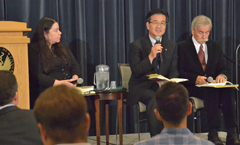Event introducing Okinawan literature held at US Library of Congress

Literary scholar and president of Meio University Katsunori Yamazato (center) and University of Hawaii Professor Frank Stewart at an event introducing Okinawan literature at the US Library of Congress in Washington DC on September 11.
September 14, 2014 Ryota Shimabukuro of Ryukyu Shimpo reports from Washington D.C.
On September 9, an event introducing Okinawan literature titled “Living Spirit” was held at the US Library of Congress in Washington D.C. Katsunori Yamazato, literary scholar and president of Meio University, and Frank Stewart, a professor at University of Hawaii, were invited as lecturers. In addition to classic works such as The Omoro Soshi (a compilation of ancient poems and songs from Okinawa and the Amami Islands) and those written by Yushiya Chiruu and Unna Nabii, the lecturers also introduced post-war Okinawa works such as The Wild Boar That George Gunned Down by Eiki Matayoshi and The Paper Plane at the Empire State Building by Eikichi Nagado. They highlighted key historical and cultural influences on the literature, including; the Battle of Okinawa and the social situation including the US military base problem after the war, traditional customs and manners, and women’s key role in spiritual culture.
The event started with the introduction of prominent Okinawan literary works by Prof. Stewart who summarized them in English. Yamazato explained the social background to the works. Yamazato stressed that social situations have been inseparable from Okinawa literature. He highlighted the importance of a petition in 2013, in which Okinawan people requested the central government to cancel the MV-22 Osprey aircraft deployment to US Marine Corps Futenma Air Station and the plan to relocate the Futenma base within Okinawa. He reflected that Okinawan people’s united action in an ‘All-Okinawa’ bi-partisan resistance showed a maturing of Okinawa society.
“Local things such as Uchinaguchi (Okinawan dialect) and Okinawan culture were not treated well in the past, but Okinawan literary people and artists have come to use uchinaguchi more often recently,” Yamazato said. He also explained the movement to restore traditional culture and identities.
(English translation by T&CT)
Previous Article:Symposium on endangered languages held to preserve the Ryukyuan languages
Next Article:Resort wedding survey: 65.8 % of people married in Okinawa say they chose the island because they “enjoy the resort feeling”
[Similar Articles]
- Anthology of Okinawan contemporary literature published
- Movie version of novel Cocktail Party more than 10 years in the making
- Compendium of Ryukyu literature to be published by Meio University
- Researcher publishes Japanese author Higuchi’s works in Vietnamese
- Japan P.E.N. Club holds Day of Peace Symposium in Okinawa, speakers say Okinawa still feels anguish of war
 Webcam(Kokusai Street)
Webcam(Kokusai Street)


